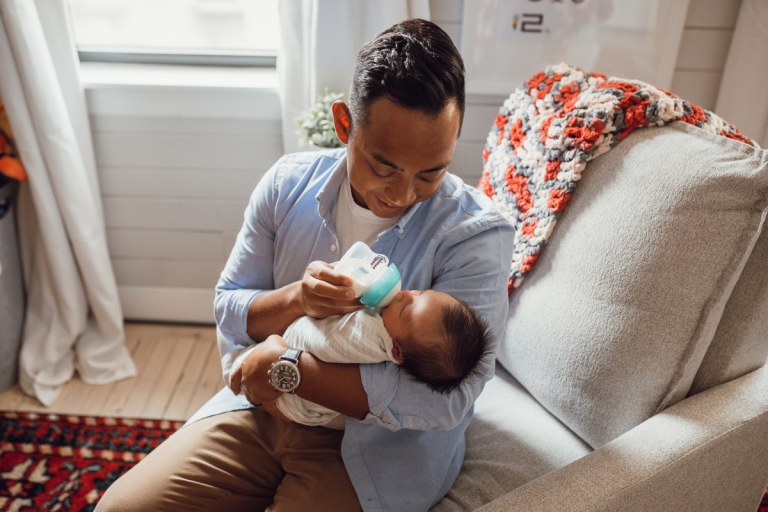
What Water Should I Use for Formula?
Can you use tap water for baby formula? Is fluoridated water safe? We talk to a pediatrician.

In This Article
Many parents choose to feed their babies formula either exclusively or in combination with breastmilk. Learning what water is best for baby formula and how to safely prepare it is important—especially since making bottles is something you’ll be doing quite a lot of during the first year of your little one’s life.
We turned to Dr. Krupa Playforth, MD, FAAP, pediatrician and Babylist Health Advisory Board member, to talk all things baby formula prep including what type of water you should use, how to safely mix formula and more.
What types of baby formula are there?
If you’re researching baby formula, it’s helpful first to understand the different types of formula available.
There are four main types of baby formula:
Cow’s milk formula. As the name implies, this formula uses cow’s milk as the main ingredient, but the milk is treated to make the protein more easily digestible. This is the most popular type of formula and makes up about 80% of all formulas sold.
Hydrolyzed formula. This type of formula contains protein that has been broken down (hydrolyzed) into smaller proteins to make it more digestible. Hydrolyzed formulas can be either partially or exclusively hydrolyzed and are often marketed as “gentle.” They’re designed for babies who can’t tolerate cow’s milk or soy-based formulas or for babies with a protein allergy.
Soy formula. Made from soy and containing a protein and a carbohydrate, soy formulas are recommended if you’re looking to exclude animal products from your baby’s diet or if your baby is intolerant or allergic to cow’s milk formula or lactose.
Specialized formula. This type of baby formula is designed for babies with particular medical needs such as prematurity or allergies.
Baby formula comes in three forms: powder formula (mix with water), concentrated liquid formula (mix with water), or ready-to-feed (premixed, no additional water needed).
What Water to Use for Baby Formula
According to Dr. Playforth, if you’re in the US and have access to a safe water source, you can use tap water to make baby formula. It’s also safe to use bottled water or distilled water.
For higher-risk infants, such as babies under three months of age, premature infants or babies who are immune-compromised, Dr. Playforth recommends following formula guidelines from the Centers for Disease Control (CDC). This includes boiling water (regardless of its source) for one minute, letting it cool for five minutes, then adding the correct amount of powdered formula.
“In general, especially for infants under three months or those with underlying health issues, erring on the side of caution makes sense,” she says.
Prepared formula should be used two hours from mixing or within one hour from the start of feeding, recommends Dr. Playforth, but can also be refrigerated and used within 24 hours if it has not been given to the infant.
Can you use fluoridated water for baby formula?
Exposure to fluoride can help prevent dental decay, and because of this, fluoride is added to the water supply in many areas. Dr. Playforth advises that it is safe to use fluoridated water to mix baby formula. There are a few things to keep in mind, though.
“Like most things, excessive exposure can cause problems. Using fluoridated water exclusively to mix formula can increase the risk of mild dental fluorosis (the white streaks on the teeth), which is a primarily cosmetic issue," says Dr. Playforth. For infants who exclusively get powdered formula, the CDC says that only using low-fluoride bottle water some of the time decreases this risk.
Can you use well water for baby formula?
Well water is not safe for baby formula.
“This is because of the risk of contaminants,” says Dr. Playforth. “This includes pathogens, and nitrates, which can lead to nitrate poisoning in infants who consume the water.”
How to Safely Prepare Baby Formula
You should always keep safety at the forefront when preparing your baby’s formula. Keep these tips from Dr. Playforth in mind:
Always wash your hands before formula preparation.
Mix the formula exactly according to the directions on the can. “I’ve seen families mix formula incorrectly or try to water it down to make it last longer, and this can be extremely dangerous for the infant.”
Use any prepared formula within one hour of mixing. Anything not consumed should be discarded. For prepared formula that has not been given to the infant, it can be stored in the refrigerator for up to 24 hours, but no longer.
Never warm formula (or breastmilk) in a microwave. Warm the bottle under running water or use a bottle warmer.
Store all unopened cans of formula in a cool, dry place. Once a can of formula powder is opened, any unused powder should be discarded after a specific amount of time. (The can will tell you how long it can be open before it must be either used or discarded; most are about a month.) Pro tip: use a marker and write the date the can was opened directly on top of the formula container to help you easily keep track.
Never use expired formula, and stay alert for any formula recalls.
Sources
Babylist content uses high-quality subject matter experts to provide accurate and reliable information to our users. Sources for this story include:
Dr. Krupa Playforth, MD, FAAP, pediatrician and Babylist Health Advisory Board member.
